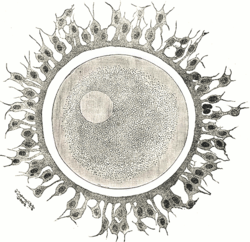яйцо
Belarusian



Alternative forms
Etymology
Inherited from Old Ruthenian ꙗйце (jajce), from Old East Slavic ꙗице (jaice), from Proto-Slavic *ājьcè, diminutive of *ȃje (“egg”), ultimately from Proto-Balto-Slavic *ṓja (“egg”), from Proto-Indo-European *h₂ōwyóm (“egg”).
Pronunciation
Noun
яйцо́ • (jajcó) n inan (genitive яйца́, nominative plural я́йцы, genitive plural яе́ц, relational adjective яе́чны, diminutive яе́чка)
- egg (approximately spherical or ellipsoidal body produced by birds, insects, reptiles, and other animals, housing the embryo within a membrane or shell during its development)
- Synonym: я́йка (jájka)
- 1918, Vacłaŭ Łastoŭski, “Brynduški-żartuški”, in Prypieŭki, Vilnius: Drukarnia „Źnič“, page 23:
- Kurka mnie jajco źniasie, / Tabie padaruju.
- A hen will lay an egg for me, and I'll gift it to you.
- (colloquial, usually in the plural) testicle, ball (the male sex and endocrine gland, found in most types of animals, that produces sperm)
- Synonym: яе́чка (jajéčka)
- 2003, Уладзімір Някляеў, “Гульні жаданняў”, in Лабух, Minsk; republished as “Піянерскі салют”, in Дванаццаць актаў (зборнік), Litres, 2022, →ISBN:
- Па беразе кульгаў прыгорблены Максім Герасімавіч Блонак Яйцы ён гразіў адарваць і піянерам, і піянеркам — хто іх там у вадзе разбярэ.
- Pa bjerazje kulʹhaŭ pryhórbljeny Maksim Hjerasimavič Blónak Jajcy jon hraziŭ adarvacʹ i pijanjeram, i pijanjerkam — xto ix tam u vadzje razbjare.
- Along the shore hobbled the hunched Maksim Hierasimavič Błonak He was making threats to tear off the testicles of both the pioneer boys and girls alike—not that anyone could tell them apart in the water anyway.
- ovum (the female gamete in animals; the egg cell)
- Synonyms: аацы́т (aacýt), яйцакле́тка (jajcakljétka)
Declension
| singular | plural | |
|---|---|---|
| nominative | яйцо́ jajcó |
я́йцы jájcy |
| genitive | яйца́ jajcá |
яе́ц jajéc |
| dative | яйцу́ jajcú |
я́йцам jájcam |
| accusative | яйцо́ jajcó |
я́йцы jájcy |
| instrumental | яйцо́м jajcóm |
я́йцамі jájcami |
| locative | яйцы́ jajcý |
я́йцах jájcax |
| count form | — | яйцы́1 jajcý1 |
1Used with the numbers 2, 3, 4 and higher numbers after 20 ending in 2, 3, and 4.
References
- Bulyka, A. M., editor (2017), “яйцо”, in Гістарычны слоўнік беларускай мовы (in Belarusian), numbers 37 (чорное – ящыкъ), Minsk: Belaruskaia navuka, →ISBN, page 308
- “яйцо” in Belarusian–Russian dictionaries and Belarusian dictionaries at slounik.org
- "яйцо" in Kandrat Krapiva's Explanatory Dictionary of the Belarusian Language (1977-1984) at Verbum
Russian
Etymology
Inherited from Old East Slavic ꙗице (jaice), from Proto-Slavic *ājьcè, diminutive of *ȃje (“egg”), ultimately from Proto-Balto-Slavic *ṓja (“egg”), from Proto-Indo-European *h₂ōwyóm (“egg”).
Pronunciation
Noun
яйцо́ • (jajcó) n inan (genitive яйца́, nominative plural я́йца, genitive plural яи́ц or я́иц*, relational adjective яи́чный, diminutive яи́чко) (* Colloquial.)
- egg
- Meronyms: бело́к (belók), желто́к (želtók), скорлупа́ (skorlupá)
- (proverb) я́йца ку́рицу не у́чат ― jájca kúricu ne účat ― don't teach your grandmother to suck eggs
- ovum
- (colloquial) testicle, ball, nut, nad, gonad
Declension
Derived terms
Compound words:
- яйцева́рка f (jajcevárka)
- яйцеви́дный (jajcevídnyj)
- яйцево́д m (jajcevód)
- яйцеголо́вый (jajcegolóvyj)
- яйцеживорожде́ние n (jajceživoroždénije)
- яйцекла́д m (jajceklád)
- яйцекла́дка f (jajcekládka)
- яйцекладу́щий (jajcekladúščij)
- яйцекле́тка f (jajceklétka)
- яйцеобра́зный (jajceobráznyj)
Compounds:
- яйцо́-пашо́т n (jajcó-pašót)
- Phrases
- подка́тывать я́йца impf (podkátyvatʹ jájca)
- те же я́йца, то́лько в про́филь (te že jájca, tólʹko v prófilʹ)
Related terms
- Borrowed
See also
- всмя́тку (vsmjátku)
- вкруту́ю (vkrutúju)
- глазу́нья (glazúnʹja)
- яи́чница-глазу́нья (jaíšnica-glazúnʹja, jaíčnica-glazúnʹja)
- болту́нья (boltúnʹja)
- яи́чница-болту́нья (jaíšnica-boltúnʹja, jaíčnica-boltúnʹja)
- яйцо́-пашо́т (jajcó-pašót)
- го́голь-мо́голь (gógolʹ-mógolʹ)
Further reading
- Dal, Vladimir (1880–1882) “яйцо”, in Толковый Словарь живаго великорускаго языка (in Russian), 2nd edition, Publication of the bookseller-typographer Wolf, M. O.
- See also: Dal, Vladimir (1880–1882) “яйно”, in Толковый Словарь живаго великорускаго языка (in Russian), 2nd edition, Publication of the bookseller-typographer Wolf, M. O.
